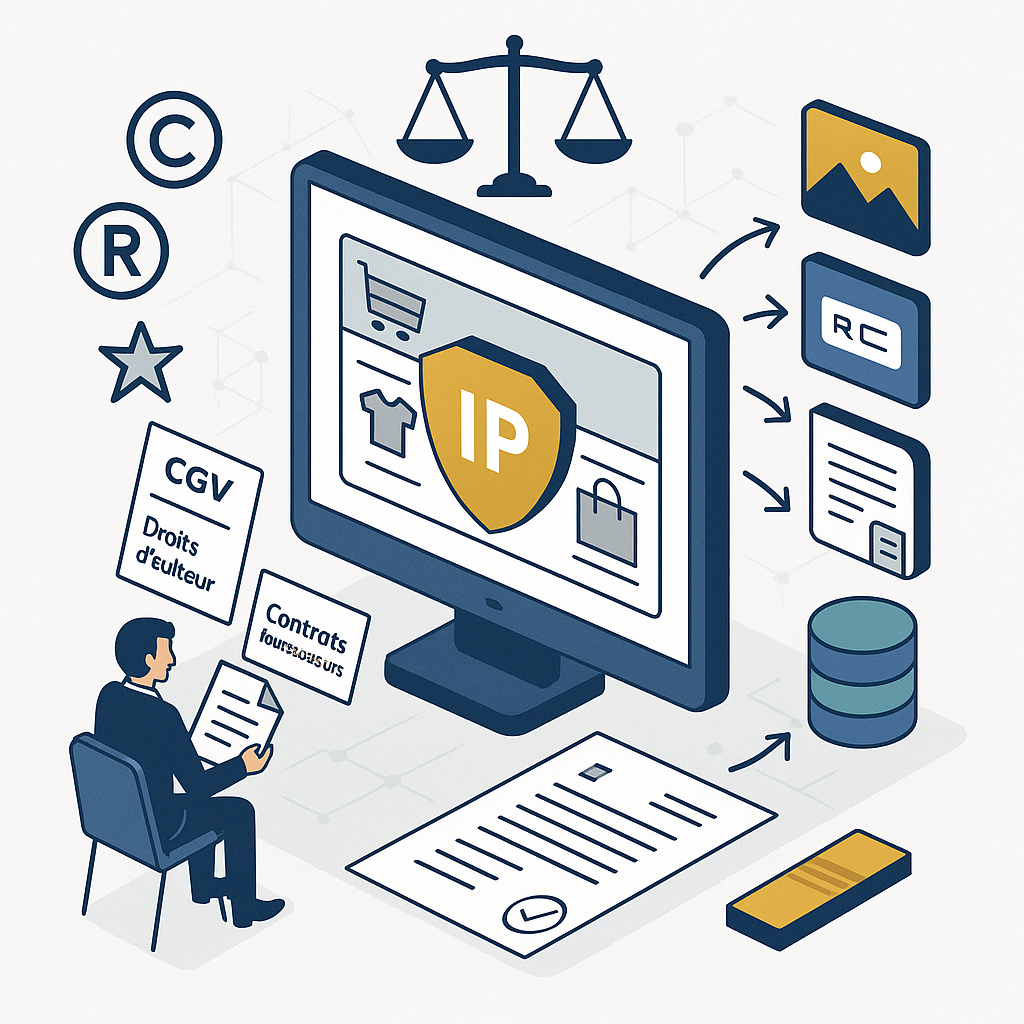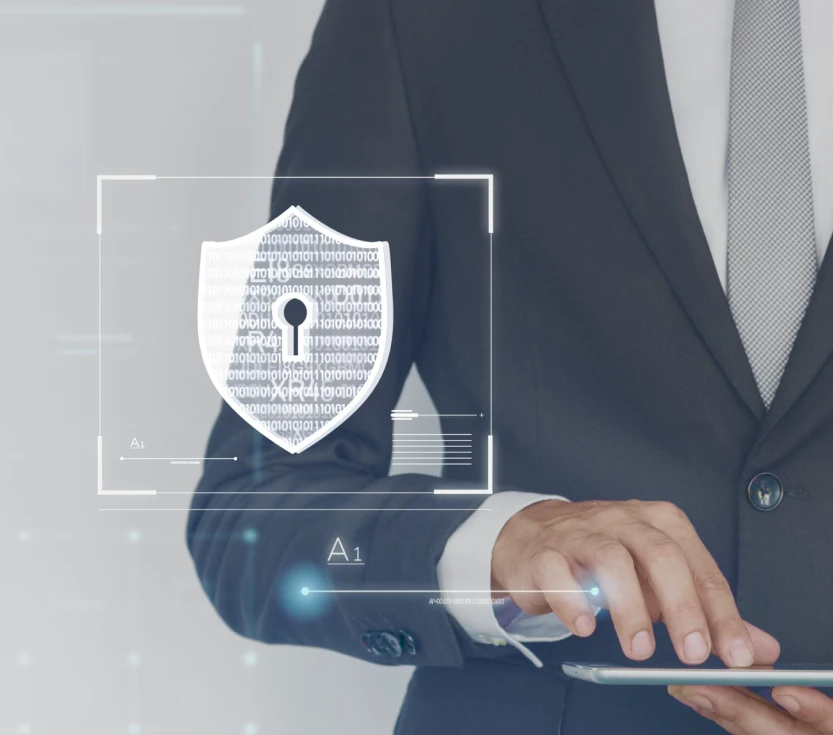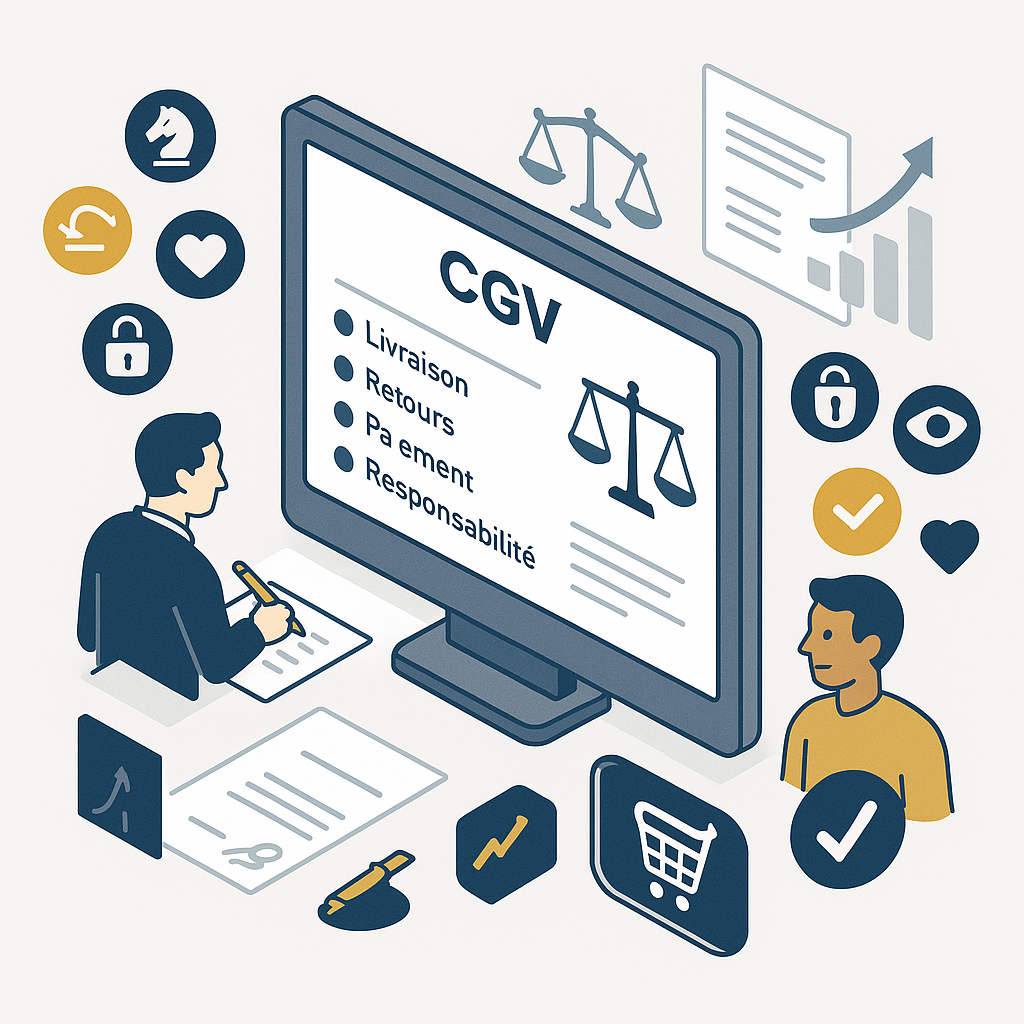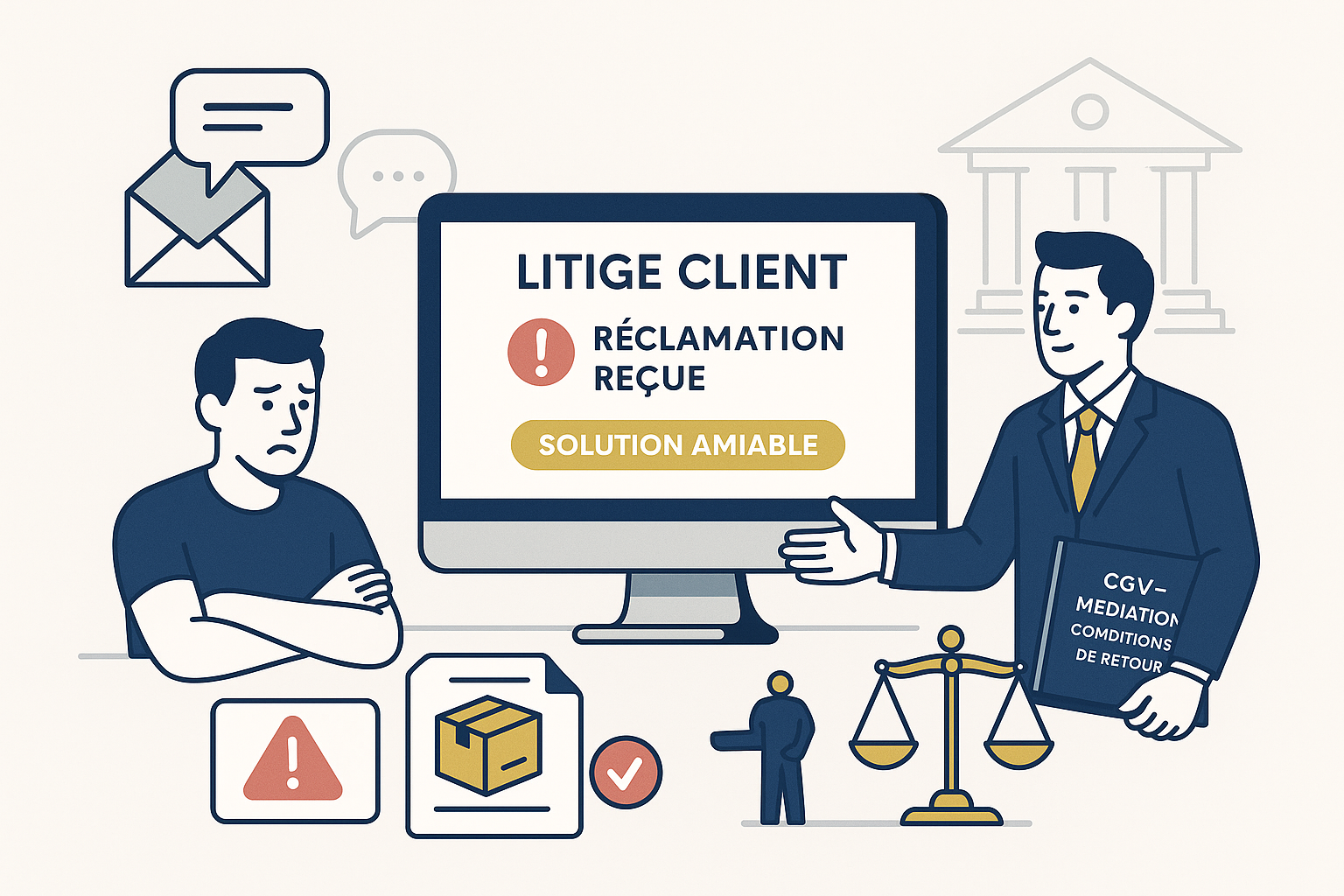
E-commerce et propriété intellectuelle : stratégies légales pour sécuriser vos actifs numériques
En e-commerce, a protection efficace de cette propriété intellectuelle devient un enjeu majeur par souci
Advice on all aspects of regulatory compliance, including RGPD, Hamon law obligations, as well as transaction security issues.

E-commerce law is a vital branch of commercial law that governs online transactions between companies and consumers.
This complex area of law covers everything from regulations governing the sale of goods and services online, to obligations relating to personal data protection and consumers' right of withdrawal.
This constantly evolving sector requires special attention to ensure compliance with national and international regulations, and to ensure fair and secure online sales practices.
Nous mettons à votre disposition un livre blanc sur le sujet, il suffit de remplir vos coordonnées sur la gauche !

As an e-commerce lawyer, my first task is to carry out a complete audit of your e-commerce site to assess its compliance with current regulations.
This includes examining legal notices, general terms and conditions of sale (GTCS), personal data protection practices, and order and delivery processing procedures.

Based on the initial analysis, I draft or update key documents such as T&Cs, privacy and data protection policies, and legal notices, ensuring their compliance with current laws, including the RGPD.

I assist in structuring order and payment processes to ensure transparency and compliance with consumer rights, including the right of withdrawal, payment terms and delivery deadlines.

In this phase, I guide you in implementing RGPD-compliant practices, including obtaining user consent, managing cookies and trackers, and implementing privacy policies.

I advise you on the legal aspects of online advertising and marketing, including email marketing campaigns, targeted advertising, and compliance with the rules on commercial communications.

I offer training courses for you and your teams to help you understand and correctly apply the rules of e-commerce.

Finally, I offer you ongoing legal monitoring to keep you informed of legislative developments affecting e-commerce. I'll make sure your site remains compliant, and adapt your practices in line with new regulations and market trends.
E-commerce sanctions are designed to ensure compliance with the rules governing online transactions. They aim to protect consumers, ensure fair and transparent business practices, and maintain confidence in digital commerce. It is therefore essential to be accompanied by an e-commerce lawyer.
Violations of e-commerce regulations can result in a variety of sanctions, including administrative fines, imprisonment and injunctions to correct non-compliant practices.
These sanctions underline the importance of compliance with e-commerce regulations to protect consumers and maintain fair and transparent business practices in the digital world.

En e-commerce, a protection efficace de cette propriété intellectuelle devient un enjeu majeur par souci

Les Conditions Générales de Vente (CGV) représentent bien plus qu’un simple document juridique obligatoire pour

Dans l’univers du e-commerce, même les entreprises les plus rigoureuses peuvent se retrouver confrontées à
To comply with the RGPD, you must clearly inform users about the collection and use of their data, obtain their explicit consent, and allow them to access, rectify, or delete their information. It's advisable to consult a specialist lawyer to make sure your site is compliant.
Your site must clearly display legal notices, including company identity, contact details, hosting company information and, if applicable, regulatory authorizations. This information must be easily accessible to users.
The right of withdrawal allows consumers to cancel an online purchase within 14 days without justification. You must clearly inform customers of this right, and provide a standard withdrawal form on your website.
Terms and conditions must include the characteristics of the goods or services, prices, delivery and payment terms, legal warranties and withdrawal terms. They must be drafted in a clear and comprehensible manner.
You need to set up a clear privacy policy, obtain users' consent for the collection of their data, and guarantee the security and confidentiality of this data. It's also important to comply with users' requests concerning their data.
To sell regulated products, you need to comply with specific rules, such as possessing the necessary licenses, undergoing appropriate training, and including appropriate warnings on your site.
Prices must be clearly indicated and include all taxes and additional charges. Any ambiguity or concealment of additional costs may be considered misleading.
Sanctions can include significant fines, imprisonment, and injunctions to change your practices. Compliance is essential to avoid these legal and financial risks.
To secure transactions, use recognized and secure payment methods, and make sure your site complies with data security standards such as PCI DSS.
You need to clearly define delivery terms and conditions, including delivery times and charges, as well as return and refund policies. It's important to respect these commitments to maintain customer confidence.
In a world where online commerce is becoming increasingly important, legal legal compliance is becoming a crucial issue for companies. Calling on a lawyer specialized in e-commerce can help you secure your business, avoid penalties and boost customer confidence. Whether to ensure compliance with the RGPDcompliance, drafting legal documents or protecting intellectual property rightsthe intervention of a legal expert is essential.
Indeed, the regulations surrounding e-commerce are constantly evolving, making it a complex task for e-tailers to ensure they comply with the laws in force. A specialized lawyer offers expertise in navigating this legal landscape, and helps companies protect themselves against legal risks. This article explores the various services an e-commerce lawyer can offer to help businesses navigate a complex and constantly evolving legal landscape.
With professional assistance, companies can not only comply with legal legal requirementsbut also optimize their operations for sustainable success.
Visit legal compliance is an essential step for any e-commerce company wishing to operate with peace of mind. This process generally begins with a website audit. This audit verifies that all the site's pages and functionalities comply with current regulations, such as the RGPDlegal notices general terms and conditions of sale (GTCS)and the general conditions of use (GCU). The audit identifies any gaps and proposes corrective measures to ensure compliance.
Another key component of compliance is the updating of legal updating legal documents. This includes drafting or revising T&Cs, privacy policies and cookie charters. These documents are crucial for informing users of their rights and the company's obligations. A e-commerce lawyer can assist with this task, ensuring that all legal aspects are covered and that documents are drafted clearly and accurately.
It is important to to maintain constant vigilance on legislative and regulatory developments. Laws can change rapidly, and a site in compliance today may not be tomorrow. Regular monitoring with a lawyer helps to keep up to date and adapt company practices accordingly. This includes training internal teams on new legal requirements and implementing best practices to avoid sanctions and litigation.
Legal compliance is not just an obligation, but also an opportunity to strengthen customer confidence and secure business activity. A rigorous auditand up-to-date and proactive proactive vigilance are the pillars of successful compliance, ensuring the company's long-term future.
The data protection and cybersecurity are major concerns for e-commerce companies. Compliance with the RGPD is at the heart of this approach, imposing strict obligations on the collection, storage and processing of personal data. A e-commerce lawyer can help set up robust data protection policies, ensuring compliance with European standards. This includes drafting privacy policies policies, as well as the management of access access and and deletion of user data.
At the same time online transaction security is crucial to protect sensitive customer information, such as payment data. Cybersecurity cybersecurity must be put in place to prevent data breaches and cyber-attacks. This includes the use of advanced security protocols such as SSL/TLS for secure communications, and the implementation of password password management andtwo-factor authentication.
The support of a lawyer also makes it possible toanticipate risks and react effectively in the event of an incident. In the event of a data breachit is crucial to have a response plan in place, including notification of the relevant authorities and affected users. A lawyer can also assist in managing litigation related to cybersecurity, whether with customers, partners or regulatory authorities.
The training internal teams on the challenges of data protection and cybersecurity is also essential. Regular training sessions raise employee awareness of best practices and new threats, strengthening the company's resilience in the face of potential attacks.
Data protection and cybersecurity are not just legal obligations, but imperatives for the trust of customer confidence and operational operational security operational security. An e-commerce lawyer plays a key role in implementing these measures, ensuring optimal data protection and proactive risk management.
Visit dispute management is a crucial aspect of any e-commerce business. The e-commerce disputes can take many forms, ranging from disputes with customers concerning conditions of sale and return policies to more more complex disputes involving unfair competition or counterfeiting. A e-commerce lawyer plays an indispensable role in resolving these disputes, offering legal expertise and a strategy adapted to each situation.
E-commerce litigation : Litigation can arise at any time, whether due to a complaint from a dissatisfied customer, an allegation of plagiarismor an inspection by the DGCCRF. The lawyer intervenes at an early stage, by analyzing the grievances and advising on the best steps to take. He can draft formal noticesnegotiate out-of-court settlementsor represent the company in court if necessary. His in-depth knowledge of the laws and regulations specific to e-commerce enables him to effectively defend the company's interests.
Dispute resolution : In addition to managing disputes, an e-commerce lawyer also helps to prevent disputes by putting in place internal procedures and team training. In the event of disputes, alternative methods of conflict resolution, such as mediation orarbitrationto avoid lengthy and costly legal proceedings. The lawyer then plays the role of mediatorfacilitating dialogue between the parties and finding mutually acceptable solutions.
Risk prevention : An important aspect of litigation management is the risk prevention. The lawyer advises on best practices to minimize the risk of future disputes, such as drawing up clear clear contractsand monitoring legislative developmentsand implementing compliance measures measures. Particular attention is paid to protecting the company's online reputation by monitoring and managing customer opinions and comments.
Litigation management is an area where the expertise of an e-commerce lawyer is indispensable. His role is not limited to dispute resolutionbut also includes dispute prevention and the strategies to protect to protect the company in the long term. With the right legal support, companies can not only effectively resolve disputes when they arise, but also strengthen their legal compliance and their legal certainty.
Visit intellectual property is a central element for e-commerce companies, guaranteeing the protection and enhancement of their digital assets. A e-commerce lawyer plays a crucial role in securing intellectual property rightsThese include trademarks, domain names, graphic content, videos and texts. Protecting these assets is essential to avoid plagiarism and economic parasitism.
Protecting digital assets: Registering trademarks and domain names is an essential first step. A lawyer can help you register trademarks with the appropriate authorities and secure domain names to avoid the risk of cybersquatting. They also advise on the management of copyright and the protection of original creations, such as logos, website designs, and written or visual content.
Plagiarism prevention : To guard against plagiarism, a lawyer can set up monitoring and and protection. This includes the use of plagiarism detection technologies and the implementation of restrictive contractual clauses for partners and suppliers. In the event of proven plagiarism, the lawyer intervenes to assert the company's rights, taking legal action for infringement or unfair competition.
Managing intellectual property disputes: When a dispute arises, the lawyer represents the company to defend its intellectual property rights. This may involve drafting formal noticesnegotiating out-of-court settlementsor pursuing legal proceedings. The lawyer also handles management of trademark portfoliosensuring that registrations are renewed and kept up to date.
Valuation strategies : Beyond protection, a specialized attorney helps to add value to intellectual property assets. This includes evaluating and optimizing the use of trademarks, patents and copyrights to maximize their value. From licensing agreements can be drawn up to enable the company to benefit from its creations while retaining its exclusive rights.
Protecting intellectual property is a strategic approach that ensures legal certainty and and enhances the value of an e-commerce company. With the support of a specialized lawyer, companies can not only defend their rights, but also fully exploit the economic potential of their intellectual creations, thereby strengthening their market position and competitiveness.
L'strategic coaching by a e-commerce lawyer is essential to maximize the performance and compliance of an e-commerce business. This support includes advice on digital strategystrategy legal action plansand training internal teams to meet the sector's specific challenges.
Digital strategy consulting : An e-commerce lawyer helps you develop legal strategies that support the company's business objectives. This can include the creation of customized contracts for partnerships and suppliers, optimizing general conditions of sale to increase legal protection, and implementing privacy policies policies. Working closely with management teams, the lawyer identifies legal opportunities and risks, helping to align business initiatives with regulatory requirements.
Legal action plans : Strategic support also involves implementation of legal action plans to anticipate and manage potential crises. This includes the preparation of response protocols in the event of data breaches, proactive management of potential conflictsand regularly updating legal documents to reflect new regulations. With a clear plan of action, companies can respond quickly and effectively to legal challenges, minimizing business disruption.
Training internal teams : The team training is a crucial component of strategic coaching. Regular training sessions raise employee awareness of legal legal best practices and to new regulations. This strengthens the company's ability to maintain compliance and prevent litigation. Training courses can cover a wide range of topics, such as data protectiondata protection contractual obligationsand industry-specific regulations.
Case studies and feedback : A specialist lawyer can also provide case studies and feedback to illustrate best practices and successful strategies adopted by other companies. These real-life examples provide valuable insight into the challenges faced and effective solutions implemented, enabling the company to build on the lessons learned.
Strategic support from an e-commerce lawyer enables a company not only to comply with legal requirements, but also to optimize its operations for enhanced performance. Thanks to strategic advicelegal legal action plans and ongoing ongoing trainingWith the right combination of strategic advice, well-defined legal action plans and ongoing training, companies can successfully navigate a complex and ever-changing legal environment, ensuring their growth and sustainable success.
Calling on a e-commerce lawyer is an essential strategic step for any company operating online. Legal support offers comprehensive protection protection against legal risks customer confidence and optimizes business performance.
Whether for legal compliancecompliance data protectiondata protection dispute managementor the intellectual property developmentthe involvement of a legal expert enables us to anticipate and effectively manage legal challenges. By integrating a sound legal strategycompanies can not only protect themselves against sanctions and litigation, but also exploit new opportunities for growth.